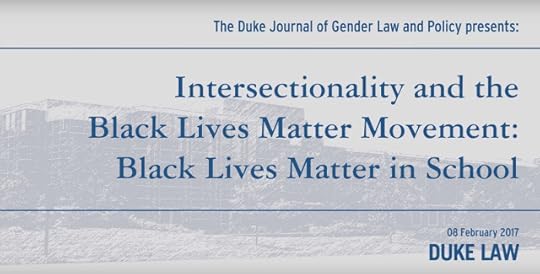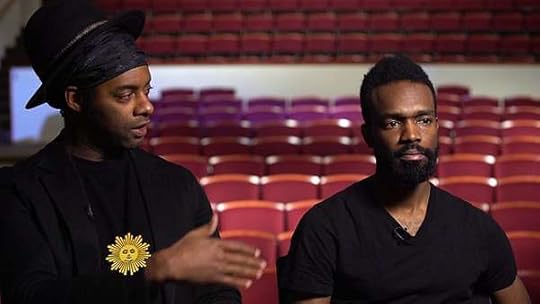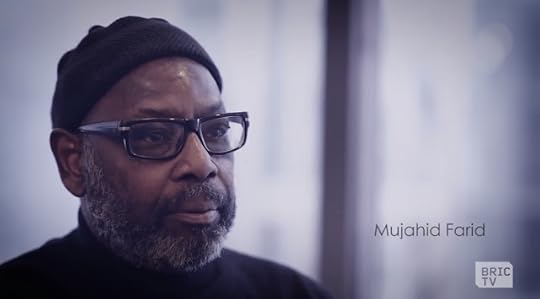Mark Anthony Neal's Blog, page 532
February 28, 2017
Dave Zirin: Understanding The NBA's Current Political Moment
 'The NBA is no stranger to matters of politics and activism. But with its multicultural reach, the NBA is taking a different approach, says
Dave Zirin
, sports editor for The Nation magazine, and host of "The Edge of Sports" podcast. Zirin explains how NBA Commissioner Adam Silver is supporting coaches and players to be outspoken, and how this moment could affect how other professional athletes speak out against Trump.' -- The Takeaway
'The NBA is no stranger to matters of politics and activism. But with its multicultural reach, the NBA is taking a different approach, says
Dave Zirin
, sports editor for The Nation magazine, and host of "The Edge of Sports" podcast. Zirin explains how NBA Commissioner Adam Silver is supporting coaches and players to be outspoken, and how this moment could affect how other professional athletes speak out against Trump.' -- The Takeaway
Published on February 28, 2017 05:20
"Mother to Son": on ‘Fences’ and Climbin’ Crystal Stairs
 "Mother to Son": on 'Fences’ and Climbin’ Crystal Stairsby Simone C. Drake | @SimoneCDrake | NewBlackMan (in Exile)
"Mother to Son": on 'Fences’ and Climbin’ Crystal Stairsby Simone C. Drake | @SimoneCDrake | NewBlackMan (in Exile)I have read reviews of Denzel Washington’s film adaptation of August Wilson’s play Fences framed by reviewers and general moviegoers who viewed the film with their fathers or fathers viewing with their sons. I could have insisted my husband take our thirteen year old son, the oldest of our three sons, to see the film. After all, the film’s most prominent motif is that of fathering and the sociological realities and psychological traumas that come into play when race, gender, and class intersect in that familial construct. But, I had just taught the play fall semester in an “Introduction to African American Literature” course, and I really wanted to see the film, so I took my son with me.
Upon arrival at the movie theatre, my son insisted he had changed his mind and wanted to see Sing with my husband and my younger sons. He even tried to slyly join his brothers in their theatre house. I cannot be sure what my son thought of the film. He shifted in the reclining seat several times during the movie. When I whispered to him periodically explaining historical or social context, he nodded ever so slightly, barely acknowledging I spoke to him, eyes directed straight ahead at the screen. When the film credits ended, he asked if I was ready to go and abruptly bounded down the stadium stairs. When I caught up to him and asked what he thought, he simply mumbled it was “okay” and proceeded toward the exit.
I would imagine that, to my son, Troy Maxson’s hardness, stubbornness, and selfishness toward his sons and, in particular, his teenage son, Cory, made my son think about his relationship with his father. My husband is not Troy Maxson, but to a budding teenage boy, their disagreements and testosterone-driven arguments likely struck my son as quite similar to those between Troy and Lyon and especially between Troy and Cory.
Troy actually shares much more in common with my grandfather, who was born just shy of ten years after the fictional Troy and also grew up in the Jim Crow South prior to leaving to fight both Jim Crow and fascism as a trailblazing African American officer in a segregated military. I nonetheless doubt that critical difference stopped my son from suspending time and place to see himself and his father on the screen.
The suspension of time and space is indicative of the genius of August Wilson and the superb directorial skills of Washington who played Troy alongside Viola Davis as his wife Rose, as the two reprised their Broadway performance from 2010. The entire cast skillfully brought the characters to life on the screen, compelling the audience to feel their pain, losses, frustrations, and brief moments of joy and satisfaction.
Washington faced a tall order directing the film adaptation of one of the most celebrated American playwrights and of a play that has been performed thousands of times. What Washington did through film was bring Wilson to the everyday people he wrote about. As a film showing in movie theatres, Fences became far more accessible to the masses than it has been as a theatrical production, and certainly as a Broadway production.
Furthermore, when moving from stage to set, the dynamism of The Hill, the Pittsburgh neighborhood Wilson so lovingly chronicled, the audience gets even more of a connection to the characters. The shotgun house, the children playing in the street, and the back porch stoop of a ramshackled backyard undergird the dialectic of pain and joy effused through the characters.
Fences pulls the audience into a time and space when mass movements for civil rights were launching throughout the South and the masses of Black folk who migrated from those cities faced de facto segregation in the North. In this time and space Wilson offers a complicated story of what it means to be human. Through the writing and performance it becomes difficult to simply see Troy as a murderer, brute father, and adulterer. This is not to say Wilson proposes Troy’s transgressions be ignored or excused; instead he offers a complex black maleness. The pain of being raised by his own callous father emanates from Troy as he tells his childhood story to his friend Bono and Lyons, yet he models his father’s behavior with his own two sons.
Wilson tempers this inter-generational repetition of social dysfunction, however, through Troy’s undying devotion to his brother, Gabriel, who suffered head trauma during World War II. Troy cares for his brother and is uncritical of his infantile and delusional behavior. In perhaps the most compelling scene of tenderness in the film, Troy feeds Gabriel a meal during a visit to the institution he unwittingly committed him to due to his own illiteracy.
This depth of humanness makes it difficult to judge Troy for his dream crushing and infidelities, particularly when he delivers his “I need to feel like a man” speech to Rose on the occasion of revealing he will soon be the father of another woman’s child. By then, viewers know that Troy is broken.
Yet what is so marvelous about Wilson’s ability to reach deep down into the souls of his characters is his creation of Rose Maxson. It is Rose who dismisses a familiar black male crisis narrative that subordinates and erases black women’s pain, suffering, hopes, and dreams. Troy might be broken, but he must be accountable, too. Rose declares Troy a “womanless man” when she agrees to raise his motherless child after the child’s mother died during the delivery. In spite of embodying 1950s tropes of domesticity, she is not the mythic strongblackwoman who moves through life unaffected by inequality and wrongs. Rose is therefore why Fences is just as much a mother-to-son film as it is a father-to-son one. My son saw a cast of black men and black women in all their humanness as they climb Langston Hughes’s proverbial crystal stairs.
+++
Simone C. Drake is Associate Professor of African American and African Studies at The Ohio State University. She is the author of Critical Appropriations: African American Women and the Construction of Transnational Identity (LSU Press) and When We Imagine Grace: Black Men and Subject Making by the University of Chicago Press.
Other essays from Simone C. Drake:‘Cause I Slay: A Beyoncé Timeline for February 2016Witnessing While White and the Violence of Silence
Published on February 28, 2017 05:09
February 27, 2017
The Disability Visibility Project™: Hip-Hop, Disability & Police Profiling
 'Keith Jones interviewed Leroy Moore Jr. for the Disability Visibility Project™ at StoryCorps San Francisco. In this clip, Moore and Jones talk about their experiences being Black Hip Hop artists living with Cerebral Palsy. Jones and Moore share about how they got involved in the New York Hip Hop scene in the late 1970s and how their love of hip hop plus the discrimination they face moved them to create Krip Hop Nation. Jones and Moore also describe how they grew up and their experiences of police profiling.'
'Keith Jones interviewed Leroy Moore Jr. for the Disability Visibility Project™ at StoryCorps San Francisco. In this clip, Moore and Jones talk about their experiences being Black Hip Hop artists living with Cerebral Palsy. Jones and Moore share about how they got involved in the New York Hip Hop scene in the late 1970s and how their love of hip hop plus the discrimination they face moved them to create Krip Hop Nation. Jones and Moore also describe how they grew up and their experiences of police profiling.'
Published on February 27, 2017 05:24
February 25, 2017
What "La La Land" Gets Right (and Wrong) About Jazz
 'Wonder what jazz musicians think of La La Land? We caught up with a real-life Sebastian— jazz pianist Josh Nelson (who was nearly Ryan Gosling’s hand double)— to sort fact from fiction.' -- +Jazz Night in America
'Wonder what jazz musicians think of La La Land? We caught up with a real-life Sebastian— jazz pianist Josh Nelson (who was nearly Ryan Gosling’s hand double)— to sort fact from fiction.' -- +Jazz Night in America
Published on February 25, 2017 15:31
"Exploring Visual Style" with Cinematographer Bradford Young
 'Cinematographer Bradford Young sits down with GCI Co-Founder Yuri Neyman to discuss how his artistic influences have impacted his unique sense of visual style.' -- +Global Cinematography Institute
'Cinematographer Bradford Young sits down with GCI Co-Founder Yuri Neyman to discuss how his artistic influences have impacted his unique sense of visual style.' -- +Global Cinematography Institute
Published on February 25, 2017 15:22
Intersectionality & the Black Lives Matter Movement: Black Lives Matter in School
 'The Duke Journal of Gender Law & Policy 2017 symposium,
Intersectionality and the Black Lives Matter Movement
, addresses the importance of considering intersecting gender, racial, and sexual identities while discussing the Black Lives Matter movement. Panelists include local activist Dorothy Counts-Scoggins, Maurice Green of the Z. Smith Reynolds Foundation, and Ricky Watson Jr. of the Southern Coalition for Justice. The moderator is Duke Law Professor Jane R. Wettach.'
'The Duke Journal of Gender Law & Policy 2017 symposium,
Intersectionality and the Black Lives Matter Movement
, addresses the importance of considering intersecting gender, racial, and sexual identities while discussing the Black Lives Matter movement. Panelists include local activist Dorothy Counts-Scoggins, Maurice Green of the Z. Smith Reynolds Foundation, and Ricky Watson Jr. of the Southern Coalition for Justice. The moderator is Duke Law Professor Jane R. Wettach.'
Published on February 25, 2017 15:08
"The Increasing Saliency of Race in Brazil and What the Future Holds" -- Lecture by Gladys Mitchell-Walthour
 'Racism: an unfortunately common theme throughout the Americas -- which also serves as the bulk of the African diaspora. But what does this hideous reality look like in the 5th largest nation in the world, where over 50% of its population are of African descent? Poverty, crime, and the lack of opportunities are an ever-present specter to the progression of Black life in the South American giant. University of Wisconsin-Milwaukee Visiting Professor Gladys Mitchell-Walthour tackles those issues during her talk at the Global Brazil 2017 Conference.' -- +Duke Franklin Humanities Institute
'Racism: an unfortunately common theme throughout the Americas -- which also serves as the bulk of the African diaspora. But what does this hideous reality look like in the 5th largest nation in the world, where over 50% of its population are of African descent? Poverty, crime, and the lack of opportunities are an ever-present specter to the progression of Black life in the South American giant. University of Wisconsin-Milwaukee Visiting Professor Gladys Mitchell-Walthour tackles those issues during her talk at the Global Brazil 2017 Conference.' -- +Duke Franklin Humanities Institute
Published on February 25, 2017 13:15
Theater Talk: August Wilson's JITNEY
'Director Ruben Santiago-Hudson, along with actors John Douglas Thompson and Brandon J. Dirden discuss Manhattan Theatre Club's revival of the late August Wilson's play Jitney -- the first of The Pittsburgh Cycle, 10 plays portraying Black lives across 10 decades of the 20th Century. Set in a gypsy cab dispatch office in Pittsburgh's Hill District during the 1970's, Jitney reveals the outer and inner conflicts of the diverse group of African-American men who are eking out their livings as drivers. Santiago-Hudson remembers his long-standing friendship and working relationship with August Wilson. Santiago-Hudson has not only directed many of the writer's plays, but won a Best Featured Actor TONY Award in 1996 for his performance in Wilson's Seven Guitars.' -- +cunytv75
Published on February 25, 2017 13:03
The Secret of Dapping
 'In this web exclusive, photographer LaMont Hamilton and choreographer André Zakery - old hands at dapping - explain the meaning behind the greeting popular among African American males.' -- +CBS Sunday Morning
'In this web exclusive, photographer LaMont Hamilton and choreographer André Zakery - old hands at dapping - explain the meaning behind the greeting popular among African American males.' -- +CBS Sunday Morning
Published on February 25, 2017 12:55
BK Stories: RAPP--Release Aging People in Prison Fights for the Rights of Older Inmates
 'Prisons are not designed for adults who are older in age. There are no accessibility points, the showers are ill-designed, and the environment overall serves as a detriment to the mental and physical state of the inmate.
RAPP: Releasing Aging People in Prison
is a campaign with a focus on elderly populations in Prison. They target issues such as lack of access and care in prisons. Their aging re-entry task force aims to provide services and retirement aids when released.' -- +BRIC TV
'Prisons are not designed for adults who are older in age. There are no accessibility points, the showers are ill-designed, and the environment overall serves as a detriment to the mental and physical state of the inmate.
RAPP: Releasing Aging People in Prison
is a campaign with a focus on elderly populations in Prison. They target issues such as lack of access and care in prisons. Their aging re-entry task force aims to provide services and retirement aids when released.' -- +BRIC TV
Published on February 25, 2017 12:45
Mark Anthony Neal's Blog
- Mark Anthony Neal's profile
- 30 followers
Mark Anthony Neal isn't a Goodreads Author
(yet),
but they
do have a blog,
so here are some recent posts imported from
their feed.



